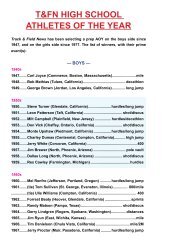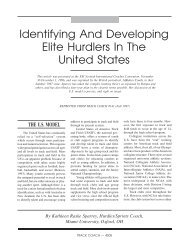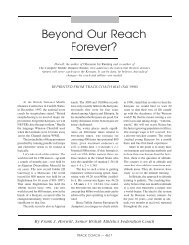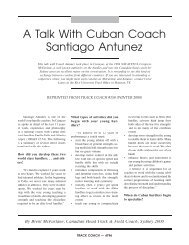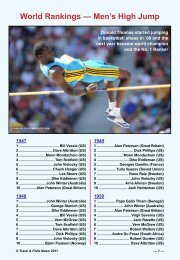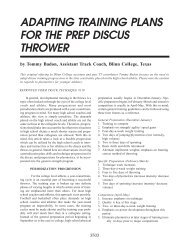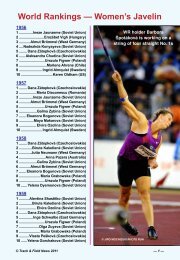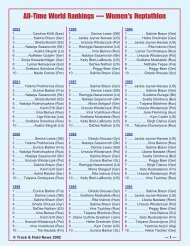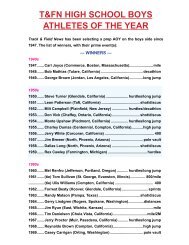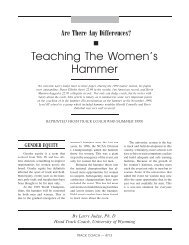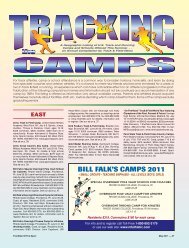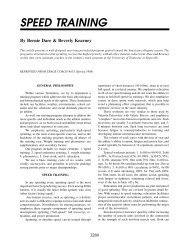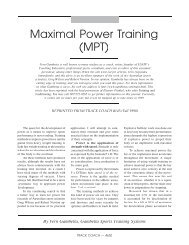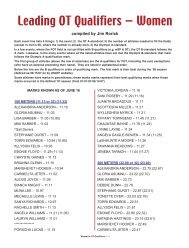DEALING WITH PRECOMPETITIVE ANXIETY - Track & Field News
DEALING WITH PRECOMPETITIVE ANXIETY - Track & Field News
DEALING WITH PRECOMPETITIVE ANXIETY - Track & Field News
You also want an ePaper? Increase the reach of your titles
YUMPU automatically turns print PDFs into web optimized ePapers that Google loves.
quick, on-the-spot decisions. In addition, these thoughts<br />
may be negative and result in preoccupation with what<br />
you can't do, rather than what you can do.<br />
DOES NERVOUSNESS ALWAYS LEAD TO<br />
BAD PERFORMANCES?<br />
Definitely not. Whenever you anticipate an event<br />
that is important to you, it is normal to feel some<br />
nervousness. In fact, it is a sign of readiness. This type<br />
of readiness is known as positive arousal and is usually<br />
referring to many of the physical cues you experience.<br />
Elite athletes channel this energy to work for them<br />
rather than against them. Answers to the following<br />
questions may help you distinguish between positive<br />
arousal and negative anxiety:<br />
1. How much does my sport require me lobe 'pumped'<br />
as I enter the competition? Some sports may require<br />
a higher state of arousal (e.g., weight lifting)<br />
than others (e.g., golf).<br />
2. Do I often have thoughts of self-doubt about my<br />
ability?<br />
3. Do I often have thoughts about factors that are<br />
beyond my control?<br />
Answering "Yes" to the last two questions iron<br />
indication that you are moving from positive arousal to<br />
negative anxiety. If you find yourself nervous but still<br />
confident in your ability, that is a sign of readiness.<br />
However, worrying about your ability to perform at<br />
levels that you normally are able to perform with ease,<br />
or worrying about factors over which you have no<br />
control may interfere with your ability to enter a competition<br />
mentally ready.<br />
RECOMMENDATIONS FOR ATHLETES<br />
1. Become more aware of your optimal level at<br />
arousal. Think of the times when you felt ready going<br />
into a competition and it worked for you. Think of<br />
other times when you were anxious and it interfered<br />
with your performance. Being as specific as possible,<br />
write down the differences between these times based<br />
on three questions (a) What thoughts made you feel<br />
ready, and what thoughts made you anxious?; (b) What<br />
feelings did you experience when you were ready versus<br />
when you were anxious?; and (c) What were the<br />
differences in your behavior between these times?<br />
This will allow you to start looking for patterns<br />
that may help you become more ware of what best<br />
prepares you mentally for a competition. Examples of<br />
when you were anxious may include thinking about<br />
whether you had prepared enough for the competition,<br />
exaggerating the skill of your opponent(s), or exaggerating<br />
the importance of the outcome of the competition.<br />
Feelings may have been an overly high sense of<br />
arousal that led you to emotionally "avoid" the competition<br />
rather than "move toward" the competition. You<br />
may have found that, behaviorally, you were more<br />
anxious when you were around others rather than by<br />
yourself. The important point is to start understanding<br />
the factors that allow you to become motivated for a<br />
competition, and the factors that tend to take you too<br />
far. A good rule of thumb is to notice when you begin<br />
to focus intently on the competition and become excited<br />
about approaching the competition. This is a<br />
good indication that you are reaching your optimal<br />
level, If self doubt occurs and you are having trouble<br />
putting it aside, you have most likely crossed into the<br />
"anxiety zone." The following recommendations may<br />
help during those times.<br />
2. Focus on things that are within your control.<br />
One of the major sources of anxiety is worrying about<br />
factors that are beyond your control. Your thoughts<br />
become preoccupied with a series of "what ifs." A<br />
great method of counter balancing this attitude is to<br />
become more performance-oriented. Being performance-oriented<br />
means that you are concerned with the<br />
thing that is most in your control—your performance.<br />
Performance-oriented athletes are more satisfied with<br />
a loss if they played their best, than if they had won and<br />
played poorly. Conversely, being outcome-oriented<br />
means that you are concerned with one thing—the win,<br />
It doesn't matter how you get there, as long as you have<br />
the big "W." We are certainly not trying to suggest that<br />
winning is not important. Of course it is; we all enjoy<br />
the thrill of winning. However, by placing the highest<br />
importance on the outcome, think of the added pressure<br />
you have placed upon yourself. We should hasten<br />
to add that it is unnecessary pressure. So many other<br />
factors beyond your control play into whether or not<br />
you win (e.g., the opponent's ability, where you are<br />
playing, coaching, weather). Most of our anxiety lies<br />
in the fear of the unknown. We can reduce this fear by<br />
pulling in the ranks to focus on what is truly within our<br />
control. When you think about it, being more performance-oriented<br />
is likely to increase your chances of<br />
winning. You will be approaching the competition<br />
focused on what you can do and what needs to be done<br />
to perform your best.<br />
In addition, as you begin concentrating on your<br />
performance in the precompetitive period it is usually<br />
best to concentrate on your strengths. Focus on what<br />
you can do, not what you can't do. Practice is where<br />
you work on your weaknesses. The competition is the<br />
time to capitalize on your strengths and on your improved<br />
areas. Therefore, focus intently on these areas.<br />
If you feel your arousal level getting too high, take a<br />
moment to regroup and say to yourself "OK, I'm going<br />
to show them what l can do, and not worry about what<br />
I can't do. I'm going to give 100% of the potential I<br />
3514



